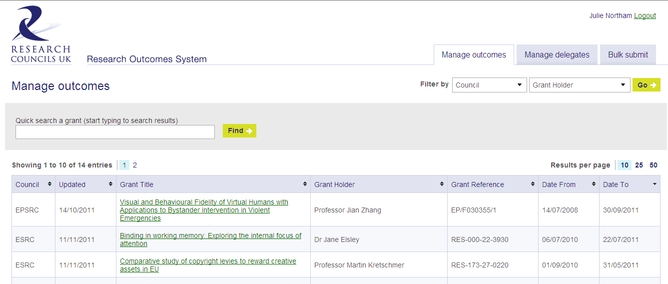 Research Councils UK (RCUK) is due to release a beta version of the ‘Gateway to Research’ portal imminently to give the public better access to information about research funded by the Research Councils.
Research Councils UK (RCUK) is due to release a beta version of the ‘Gateway to Research’ portal imminently to give the public better access to information about research funded by the Research Councils.
Gateway to Research aims to provide a mechanism for businesses and other interested parties to identify potential partners in universities to develop and commercialise knowledge, and maximise the impact of publicly funded research. It is being developed as part of the BIS Innovation and Research Strategy, published in December 2011.
The beta Gateway to Research contains information such as who, what and where the Research Councils fund, as well as details about the outcomes, outputs and impact from research, linking to already available open access repositories and data catalogues.
The information contained within the Gateway to Research beta version is a fixed snapshot of available information on research. It contains real data from grants across all seven Research Councils, awarded from 2006 onwards, that is already held in data sources such as RCUK’s Research Outcomes System (ROS) (please see the Principles of Use document for more details) and ResearchFish. Therefore the data is not new – Gateway to Research brings the information together in one place. Any updates and additional information about research need to be made in data sources – they cannot be made directly on Gateway to Research.
Updates made in data sources will not update the beta system automatically as this will initially be a manual process and it may take some time. Over the next year, RCUK will be building the infrastructure to ensure that the data will be routinely updated once the final live system is launched at the end of 2013. Updates to output data will then be reflected in Gateway to Research after they have been submitted.
RCUK need your feedback
The beta version has gone through robust technical testing and is close in look, feel and function to how RCUK envisage the final product. However, it is important that they ensure the data it delivers and its functionality meets the needs of its users.
RCUK are therefore calling on people to use and interrogate the beta site and provide feedback to RCUK on their experience to inform the development of Gateway to Research over the next year. They would like to encourage third parties to investigate innovative ways that the data can be used and shared to take it to a broader audience.
You can access the beta Gateway to Research at http://gtr.rcuk.ac.uk/ . It is currently password protected but it will be publicly available for you to use when it is officially released within the next few days (on or around 12 December 2012).
Please email your feedback to gateway@rcuk.ac.uk .
Updating information about your research
Colleagues within BU are aware of the process for updating information about the outcomes and outputs of their research, through ROS and ResearchFish. If you require more information then please refer to the ‘Principles of Use’ document above or visit RCUK’s web site to find out what ROS is, how it works, and how it can benefit you.
If you have any further questions, please email gateway@rcuk.ac.uk or contact individual Research Councils for information on specific areas of research.














 Expand Your Impact: Collaboration and Networking Workshops for Researchers
Expand Your Impact: Collaboration and Networking Workshops for Researchers Visiting Prof. Sujan Marahatta presenting at BU
Visiting Prof. Sujan Marahatta presenting at BU 3C Event: Research Culture, Community & Can you Guess Who? Thursday 26 March 1-2pm
3C Event: Research Culture, Community & Can you Guess Who? Thursday 26 March 1-2pm UKCGE Recognised Research Supervision Programme: Deadline Approaching
UKCGE Recognised Research Supervision Programme: Deadline Approaching ECR Funding Open Call: Research Culture & Community Grant – Apply now
ECR Funding Open Call: Research Culture & Community Grant – Apply now ECR Funding Open Call: Research Culture & Community Grant – Application Deadline Friday 12 December
ECR Funding Open Call: Research Culture & Community Grant – Application Deadline Friday 12 December MSCA Postdoctoral Fellowships 2025 Call
MSCA Postdoctoral Fellowships 2025 Call ERC Advanced Grant 2025 Webinar
ERC Advanced Grant 2025 Webinar Update on UKRO services
Update on UKRO services European research project exploring use of ‘virtual twins’ to better manage metabolic associated fatty liver disease
European research project exploring use of ‘virtual twins’ to better manage metabolic associated fatty liver disease